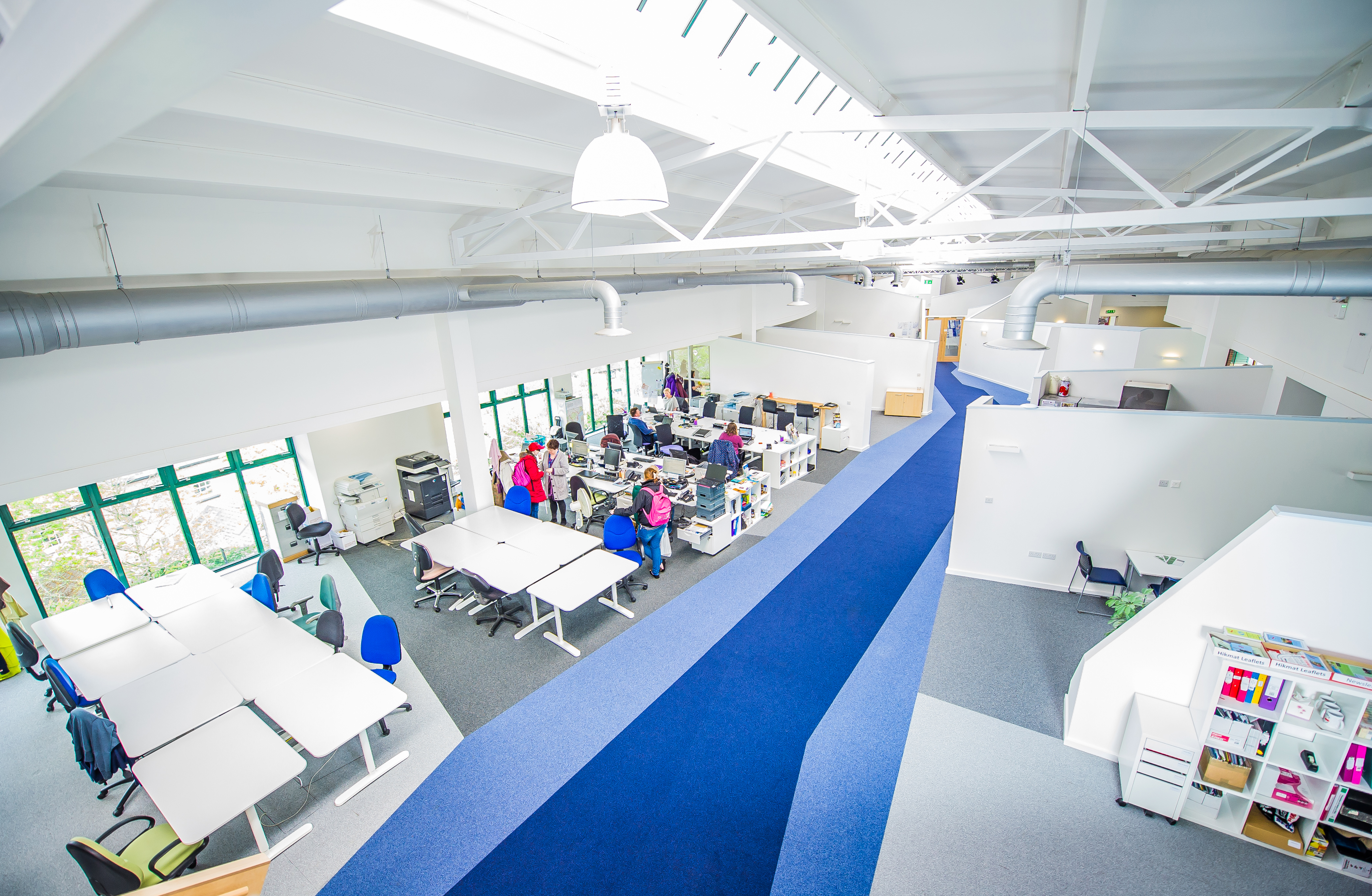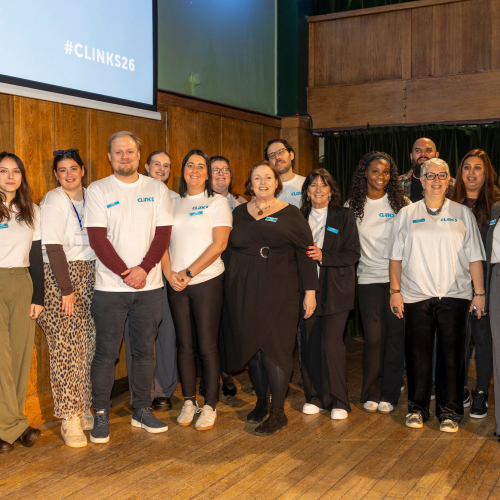In this guest blog, Simon Bowkett, Chief Executive of Exeter CVS & CoLab, tells us about the creation of an exciting multi-agency space and the ongoing challenge of joining 25 different service cultures and practice together.
This month sees the launch of CoLab in Exeter – a multi-agency and cross-sector partnership that will bring together over 25 different services and projects under one roof to offer a joint response to some pressing challenges. Currently, preventing reoffending and reducing city centre crime and anti-social behaviour are right up there on the priority list.
To Clinks members, the creation of yet another hub will not be anything new, but perhaps what makes CoLab a little different is that the hub is not hosted by a criminal justice service provider, or indeed any other provider, but by Exeter CVS - a voluntary sector infrastructure organisation (or ‘civil society support’ organisation as we have come to call ourselves).
A busy, diverse and ambitious band
The new CoLab hub brings together a range of services from the community sector, the public sector and the private sector, including Working Links, our local prime contractor for probation services. These services work across criminal justice, health and social care, and housing pathways, alongside the core business of Exeter CVS which includes social action, volunteering, lifelong learning and enterprise and employability skills. Services include everything from a GP surgery (specialising in homeless health) to a Black, Asian, and minority ethnic support service; from mental health crisis outreach to housing support; from an assertive homeless outreach service to a social enterprise mentoring first time offenders. It also includes Exeter MEAM, a partnership which aims to reduce suffering and improving outcomes for people with multiple and complex needs, by promoting better coordination and flexibility of service provision. It is a busy, diverse and ambitious band.
Success has many fathers as they say, and CoLab is no different. CVS were already resident in one part of Wat Tyler House – previously a poll tax collection office belonging to Exeter City Council – when the rest of the building became vacant. So began a conversation to take on the whole premises as a community asset, and a centre for social action and change. Around the same time that we began negotiations in earnest, Working
Links approached us looking for voluntary sector partners in their local Transforming Rehabilitation tender – and talked enthusiastically of their vision for community-based hubs being at the centre of their offer.
The development of a hub on this scale was certainly not in our thinking a few years ago, and while we are very proud of what has been achieved so far, I have to admit that there is something very opportunistic about it. To our delight we were awarded £440,000 from Public Health England under the Recovery Capital Fund to begin transforming the building into a multi-agency workspace, designed to promote easy access and engagement for our visitors, and active co-working and collaboration for services and their employees.
A space with no labels
We embarked on an arts-based eight-week consultation with service users, providers and their staff, commissioners and stakeholders within the community to shape the evolution of design. What could the space look like, feel like, sound like? How could the space be experienced – both for those visiting, and for those working within it? Some key themes emerged. Visitors wanted a space where they could visit as themselves – not as ‘an offender’, ‘an addict’, ‘a rough sleeper’, a ‘volunteer’, but as a person. This would need to be a space with no labels, and therefore no stigma. They also talked of a local service system where they need only tell their story once, rather than be bounced from service to service, telling and re-telling in great detail the litany of woe that led them to the door of that agency. Finally, they wanted a place where services were ambitious for them – that saw their potential, their assets and strengths, and where they were not defined by current deficits or past failures.
The river, flowing from turbulence to calm
Fast forward 12 months, and after much noise and dust around us, and many months of deadline-related stress, frustrations with everything from planning regulations to furniture deliveries (and self-builds!), and – of course – the inevitable project budget over-spend, the space is complete. It is light, modern, bright and airy – truly one of the best places to work in the city. The building itself is long, and curved to follow the contours of the multi-storey car park on which it sits, so the design concept that evolved was one of a river (bear with me!).
The river became a metaphor for a recovery journey, beginning with a phase that could be fast-moving, unpredictable, turbulent, chaotic – dangerous, even. As the river matures, the waters become calmer, and deeper. So, at one end of the building sit the services that work with people in early recovery, and often in crisis: homeless outreach, drug and alcohol services, mental health crisis outreach workers and Community Rehabilitation Company staff. As you move through the building you find family workers, personal development and training providers, the volunteer centre and carers’ support teams; and then employability programmes and the enterprise zone – a space where social entrepreneurs can rent low-cost office space or hot desks. It is a space we are hugely proud of, and already some fantastic case studies have begun to emerge of people whose lives have been transformed by services simultaneously working with and around them.
So the launch event will be a celebration that the hub project is finally finished, right? Well, yes and no. What we will be celebrating this month is that the building project is complete, but the evolution of a truly collaborative community of services is only just beginning. Changing structures is one thing, changing cultures quite another. How does probation culture fit with the culture of the NHS? How does the compassion of a counsellor fit with the need for enforcement from the police? None of us are in any doubt that this is a work in progress.
Lucy’s experience and the challenge of joining services seamlessly together
Last week we met Lucy (not her real name) who arrived on our doorstep newly homeless, and fresh from the custody suite after being arrested for the assault of two people the previous night following her eviction from a dual diagnosis housing project. Her mental health had deteriorated, and her behaviour was challenging. At one point the police had to be called (as did the fire service!).
The police revealed that she had been assessed by mental health services the previous night in custody, but was not found to be so ill that sectioning was appropriate. We contacted her mental health worker to ask her to come and assess Lucy, given her behaviour. Her keyworker told us to call the police. We explained we had called the police, and they had told us to contact her. She said Lucy’s behaviour represented a “descent into crisis” so we should contact the mental health crisis team, which we did. They consulted their system and explained that Lucy already had a keyworker, so we should contact her. We explained that we had, and that her keyworker had told us to contact them… had we tried the police, they asked? What about her GP…? And so it went on, for over four hours that day, and several more days after. We calculated that within 24 hours of her eviction Lucy had cost the public purse over £20,000.
Finally, she was sectioned, but only after a week of street homelessness, and a further alleged assault.
Joining 25 services together in a single building is a great achievement, but joining practice and cultures to become truly seamless is a whole other challenge. But we’re working on it and are determined to get there – for Lucy, and all those like her that are still free-falling through the gaps between our services as agencies try to deflect these complex people from their particular doorway.
We’ll keep you posted on how we get on…
Follow Simon on Twitter at @SimonExCVS, and CoLab on @CoLabExeter
What's new
Blogs
GUEST BLOG: #Clinks26 - Understanding the Impact of Lived Experience at My First Clinks Conference
Publications
Latest on X
The role is for a leader from an organisation focused on racially minoritised people, with expertise in service delivery, policy, advocacy, or related areas in criminal justice. Racial disparities are present at every CJS stage. This role ensures these voices are central in shaping policy to help address and eradicate them. Apply by Mon 18 Nov, 10am. More info: https://www.clinks.org/voluntary-community-sector/vacancies/15566 #CriminalJustice #RR3 #RacialEquity



